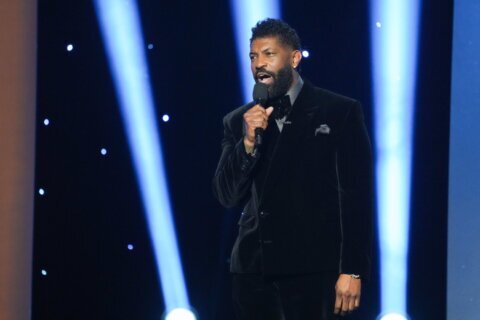Hear our full conversation on my podcast “Beyond the Fame.”
The Washington Commanders just completed a name change, so why does the National Football League still allow the defending champion Kansas City Chiefs to do the “Tomahawk Chop?”
The new documentary “Imagining the Indian” argues for the removal of all Native American names and mascots, which ultimately drove sponsors like FedEx to pressure the Washington football team to change its name in 2020.
“Remember when Dan Snyder said, ‘Never?’ Well, that didn’t hold true,” Director Aviva Kempner told WTOP.
Kempner will join co-producer, co-writer and ESPN panelist Kevin Blackistone for Q&As after public screenings this Friday, Saturday and Sunday at The Avalon Theatre in D.C. and Cinema Arts Theatres in Fairfax, Virginia.
“We started this project with Sam Bardley, who made the 30:30 doc on Len Bias, and his friend Kali McIver back in 2014,” Blackistone told WTOP. “Since 2014, the Washington football team has changed its name, the Cleveland baseball team has changed its name, so there has been change along the way. I can’t take credit for it … but there’s been an increasing groundswell of support on the streets and among fans and allyship with native people.”
The documentary features Cheyenne and Hodulgee Muscogee activist Suzan Harjo, who has led the charge to change the name since the 1970s, as well as others who have fought since the 1940s. Blackistone grew up a fan of the burgundy and gold, but first noticed the protests outside the Super Bowl in Minneapolis, Minnesota, in 1992.
“I came up in a very progressive household which happened to hold season tickets to the Washington football team forever, but this was never really an issue,” Blackistone said. “I didn’t think about it until the 1990s and really begin to study it and understand a connection between Black folks and what we feel is a misappropriation of our culture in greater society and what native people feel is a misappropriation of their culture in greater society.”
As a Black journalist, he appreciates the fight song changing from “Fight for old Dixie” in the 1930s to “Fight for old D.C.” in the 1960s. Likewise, he gets why Native Americans might be offended by white fans performing native chants: “That sort of performance in the stands by fans is really mocking native culture,” Blackistone said.
Team officials defend “Braves” or “Chiefs” as names of pride different from “Indians,” which reflected Christopher Columbus being dead wrong about where he landed, or the most blatant example, “R*dsk*ns,” which paired a specific color with the word “skin.” Still, the filmmakers don’t believe in varying degrees of offensiveness.
“It’s insulting for a majority of people in this country whose forefathers were out to eradicate or remove native people from this land, which was theirs, to then make a decision to use their likeness — that’s not their decision to make, Blackistone said. “I’m always interested in how racism started. The seed on this continent is the arrival of Europeans and their attempt to erase native people and culture. That is the beginning, then enslaved Africans.”
Kempner brings a Jewish perspective, having directed the documentary “The Life and Times of Hank Greenberg” (1998) about the Hall of Fame slugger who faced antisemitism by choosing not to play on Yom Kippur, and “The Spy Behind Home Plate” (2019) about Jewish catcher Moe Berg who helped the U.S. spy on the Nazi atomic bomb program. Fittingly, Kempner just attended Opening Day at Nationals Park against the Atlanta Braves last week.
“The most egregious in baseball is Atlanta and The Chop — as Kevin Gover says in the film, ‘Native Americans do not do The Chop. It’s a whole made up thing,'” Kempner said. “It reminds me of like a Hitler rally. … I, who have always made films about antisemitism or countering negative stereotypes about Jews, and Kevin about Blacks, we realized in working with [co-director] Ben West, who is Cheyenne himself, that together we have to counter this.”
She says it’s a more important issue than other Major League Baseball rule changes like adding a pitch clock.
“They’re changing the rules,” Kempner said. “It seems to me they could easily say there shouldn’t be racist names.”
Hear our full conversation on my podcast “Beyond the Fame.”







